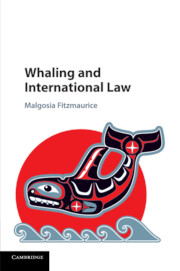Book contents
- Frontmatter
- Contents
- List of abbreviations
- Acknowledgements
- Table of cases
- Table of treaties, declarations and general comments
- Introduction
- 1 The history of whaling
- 2 The International Convention for the Regulation of Whaling
- 3 The International Whaling Commission
- 4 Cultural diversity
- 5 Environmental ethics, animal rights and the law
- 6 The IWC and its interaction with other organisations and conventions
- 7 Indigenous whaling
- 8 A case study of the protection of the narwhal whale
- Conclusion
- Appendix A Taxonomy of whales: a brief introduction on selected species
- Appendix B 1946 International Convention for the Regulation of Whaling
- Bibliography
- Index
7 - Indigenous whaling
Published online by Cambridge University Press: 05 December 2015
- Frontmatter
- Contents
- List of abbreviations
- Acknowledgements
- Table of cases
- Table of treaties, declarations and general comments
- Introduction
- 1 The history of whaling
- 2 The International Convention for the Regulation of Whaling
- 3 The International Whaling Commission
- 4 Cultural diversity
- 5 Environmental ethics, animal rights and the law
- 6 The IWC and its interaction with other organisations and conventions
- 7 Indigenous whaling
- 8 A case study of the protection of the narwhal whale
- Conclusion
- Appendix A Taxonomy of whales: a brief introduction on selected species
- Appendix B 1946 International Convention for the Regulation of Whaling
- Bibliography
- Index
Summary
Introduction
This chapter is devoted to indigenous whaling, which is one of the forms of whaling provided for by the ICRW. It is based on certain assumptions, including: that certain indigenous peoples possess a right to whaling as an aspect of their right to cultural diversity; and that such indigenous peoples, as holders/beneficiaries of such rights affirmed by international law, may be reasonably held to be under certain obligations vis-à-vis the upholding of the rule of law, including international law relating to environmental protection of the world's endangered biodiversity. Such assumptions bring to the fore whatever tensions might exist between different legal regimes relating to, on the one hand, cultural diversity and, on the other, environmental protection. There are several examples of aboriginal/indigenous whaling which illustrate this problem; the best known are the Makah peoples of the State of Washington, USA, and the Inuit peoples in Greenland.
The compatibility and harmonisation issues that arise in relation to aboriginal whaling, environmental protection and whale welfare are complex; and practice, thus far, clearly indicates the complications resulting from the reconciling of these occasionally conflicting policy objectives.
Cultural diversity and indigenous peoples
This section is not meant to present an in-depth analysis of the legal regime pertaining to indigenous peoples’ cultural diversity, as it is the subject matter of many publications and its full analysis is beyond the scope of this chapter. A general introduction is of relevance, however, as some indigenous peoples consider whaling as an expression of their cultural identity.
Central to the rights of minorities and indigenous peoples is Article 27 of the International Covenant on Civil and Political Rights (ICCPR):
In those States in which ethnic, religious or linguistic minorities exist, persons belonging to such minorities shall not be denied the right, in community with the other members of their group, to enjoy their own culture, to profess and practise their own religion, or to use their own language.
The construct of this Article was subject to some criticism as being rather vague. General Comments 21 and 23 of the Human Rights Committee (HRC) were instrumental in clarification of this Article in relation to minority rights.
The HRC's case law contributed to further understanding of the rights of indigenous peoples. There are several instruments and General Comments which relate directly to such rights.
- Type
- Chapter
- Information
- Whaling and International Law , pp. 234 - 275Publisher: Cambridge University PressPrint publication year: 2015



